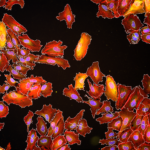Link to Pubmed [PMID] – 28156183
Gut Microbes 2017 Feb;
Listeria monocytogenes is a Gram-positive food-borne pathogen that in humans may traverse the intestinal, placental and blood/brain barriers, causing gastroenteritis, abortions and meningitis. Crossing of these barriers is dependent on the bacterial ability to enter host cells, and several L. monocytogenes surface and secreted virulence factors are known to facilitate entry and the intracellular lifecycle. The study of L. monocytogenes strains associated to human listeriosis epidemics has revealed the presence of novel virulence factors. One such factor is Listeriolysin S, a thiazole/oxazole modified microcin that displays bactericidal activity and modifies the host microbiota during infection. Our recent results therefore highlight the interaction of L. monocytogenes with gut microbes as a crucial step in epidemic listeriosis. In this article, we will discuss novel implications for this family of toxins in the pathogenesis of diverse medically relevant microorganisms.





